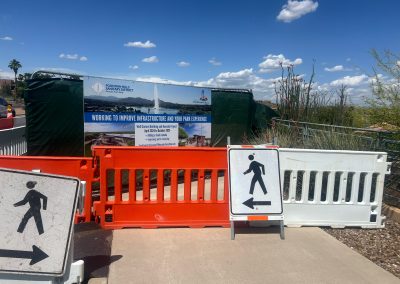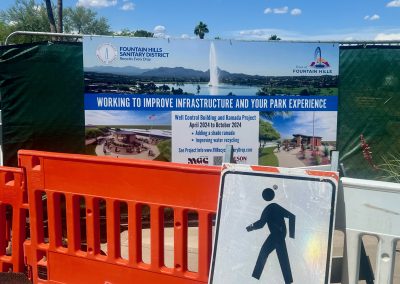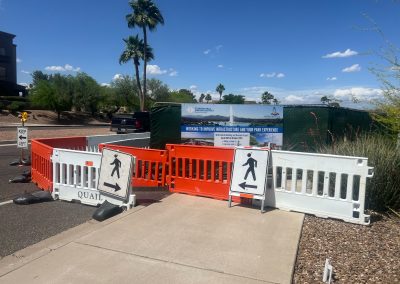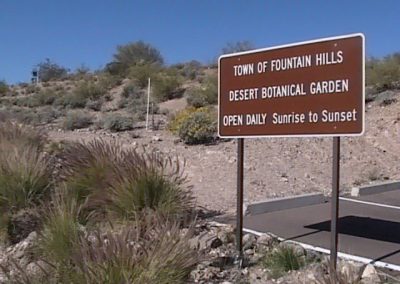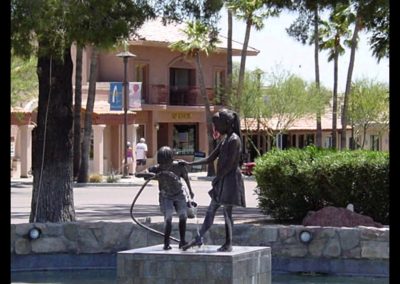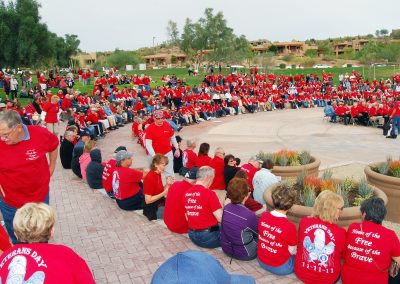
How do we fix our streets?
Flourish Fountain Hills holds as one of its fundamental Guiding Principles to Maintain and Improve the Town’s Infrastructure.
With every bump, crack, and pothole, our streets are telling us what is needed…attention.
Presentation of the Citizens Advisory Streets Committee June 20, 2023
This statement, included in a comprehensive report by the Citizens Advisory Streets Committee (CASC) will come as no surprise to the residents of Fountain Hills who drive, bike or walk on the cracked, pitted and pocked pavement of its streets. If there is one issue of community concern that virtually every resident of Fountain Hills can agree upon, it is the condition of our streets. They do, indeed, need attention: $50 million dollars’ worth of attention.
That startling figure, which exceeds the Town’s annual budget, is almost certain to set off a heated debate as to how this could have happened in a Town where the average household income exceeds $100,000 and the median home value exceeds $500,000. Too often the debate ends with finger pointing. The Town’s elected officials are blamed for the cracked and rutted streets that detract from the Town’s natural beauty, attractive homes and abundant parks.
Rather than cast blame on mayors and town councilmembers, past and present, those residents, who have repeatedly voted against measures that would provide adequate funds to maintain and repair our streets, should pause and look into a mirror. For decades the funds available for maintaining and fixing our streets have been insufficient to meet the need.
Recent campaign promises to address the shortfall by reallocation of revenue have not been fulfilled. The reality is that absent dramatic and ultimately unsustainable cuts to existing services and programs there is not enough revenue to fix the streets.
A history of inadequate funding
In 1970, Fountain Hills was established as a master planned community by McCulloch Properties (now MCO Properties, Inc.). Residents of the planned community contributed to the cost of road construction by paying assessments to a Road District. Since 1989, when Fountain Hills was incorporated, there has not had a primary property tax – and voters have repeatedly refused to approve one.
Most recently, in 2018, voters were asked to approve a primary property tax that would have generated an additional $7 million in revenue, with $4 million committed to street repair and maintenance. That measure failed by a 60-40 margin. A 2011 initiative to obtain funding for necessary street maintenance and repair through a bond also failed.
For more than 40 years, the funds available for allocation to the maintenance of streets and intersections have been drawn from: the General Fund (including sales tax revenue), state shared revenues, regional funds and grants. Since 2016, only $14.8 million has been allocated to street maintenance. Approximately 70% of that $14.8 million has been spent in the past six years, as the Mayor and Town Council have attempted to compensate for years of deferred maintenance resulting in a backlog of streets in need of repair. However, increasing the amount allocated annually to “pavement management” has not been sufficient to address the backlog of streets needing repair and the ongoing cost of maintenance.
According to one recent report, the Town’s current budget of $2.125 million annually is insufficient to maintain the streets in their current condition. According to the same report, the annual allocation of funds for repair and maintenance would need to be more than doubled (to $5 million), to address the growing backlog of streets in need of repair and improve the overall condition of the pavement.
The CARES Act provides a two-year reprieve
The Town’s day of reckoning has been deferred due to the infusion of federal funds into the economy (including local governments) through the CARES Act. For the years 2023-2024 and 2024-2025, the Town Council voted to allocate $8 million in unspent Covid Relief Funds to pavement management. It will not be enough, but it is a start.
The assessment
In September of 2021, well before the CARES ACT funding was available, the Town Council formed the Citizens Advisory Streets Commission. CASC was tasked with assessing the condition of the town’s streets and providing its findings and recommendations to the Town Council.
The members of CASC were well qualified to take on the task assigned to them. Collectively, these community volunteers had experience and expertise in civil and municipal engineering, transportation, roadway construction, infrastructure repair and replacement, the public sector, and business management.
Over a 20-month period, CASC reviewed the construction history of the streets, analyzed prior studies of street conditions commissioned by the Town, physically inspected street conditions, developed an understanding of how street conditions are determined, and explored the available funding alternatives.
In November 2022, the Town contracted with the firm, Roadway Assets Management (RAS), to conduct a comprehensive review of the current condition of the streets and provide a report and recommendations to CASC, staff and the Town Council based on its findings.
The results of the assessment
In June 2023, CASC presented its report and recommendations to the Town Council. In November 2023, RAS presented its report and recommendations. Within its borders, Fountain Hills has approximately 166 miles of pavement that it is required to maintain. The condition of streets is described by reference to a Pavement Condition Index (PCI). The following table, compiled by RAS, illustrates its findings concerning the pavement condition of the town’s streets:
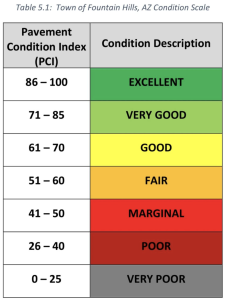
The following map, also included in the RAS report, provides an aerial perspective of the condition of the town’s streets:
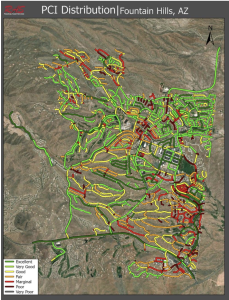
Many of the streets in the poorest condition are found in the areas of the town’s earliest development. According to CASC, substandard construction practices by the developers is one of the causes for many of the failing streets. Prior to 1989, before Fountain Hills was incorporated, the developers were not required to comply with established road construction standards. Many of these streets are now reaching the half-century mark – and it shows.
CASC’s conclusion that age and substandard construction is a significant contributing cause of the town’s failing streets is confirmed by the RAS assessment. Compare the PCI ranges in these two charts:
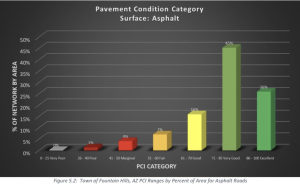
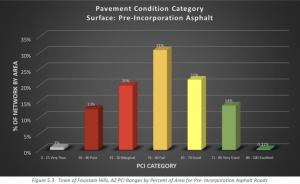
As evidenced by this comparison, the streets that were built prior to the incorporation of Fountain Hills are in direst need of attention. Not surprisingly, repairing and, in some cases, rebuilding these streets is likely to consume the majority of the funds committed to pavement management over the next five years.
“The streets in our town are falling apart.”
The poor condition of the pre-incorporation streets is not our only concern. As summarized by CASC in the overview to its June 2023 report:
“The streets in our town are falling apart; half the network is substandard. Even streets that are in good condition are subject to deterioration and must be maintained. The problem today is the result of ignoring what should have been done years ago and without an influx of capital, continual deterioration will exceed the town’s ability to sustain the network.”
It is clear that the streets cannot be fixed; nor can further deterioration be prevented, unless there is a significant increase in the funds currently allocated to street maintenance, repair and reconstruction.
The need for “significant additional revenues”
According to CASC, “without significant additional revenues, street maintenance levels cannot be achieved, which means streets will continue to deteriorate, creating failing conditions from which the town cannot possibly recover.”
Due to the decision of the mayor and town council to allocate the unused Care Act Funds to pavement management, the town has a year to determine where the funds necessary to continue the process of fixing the streets will come from.
CASC has a workable proposal that will be the subject of the next article in this series.
